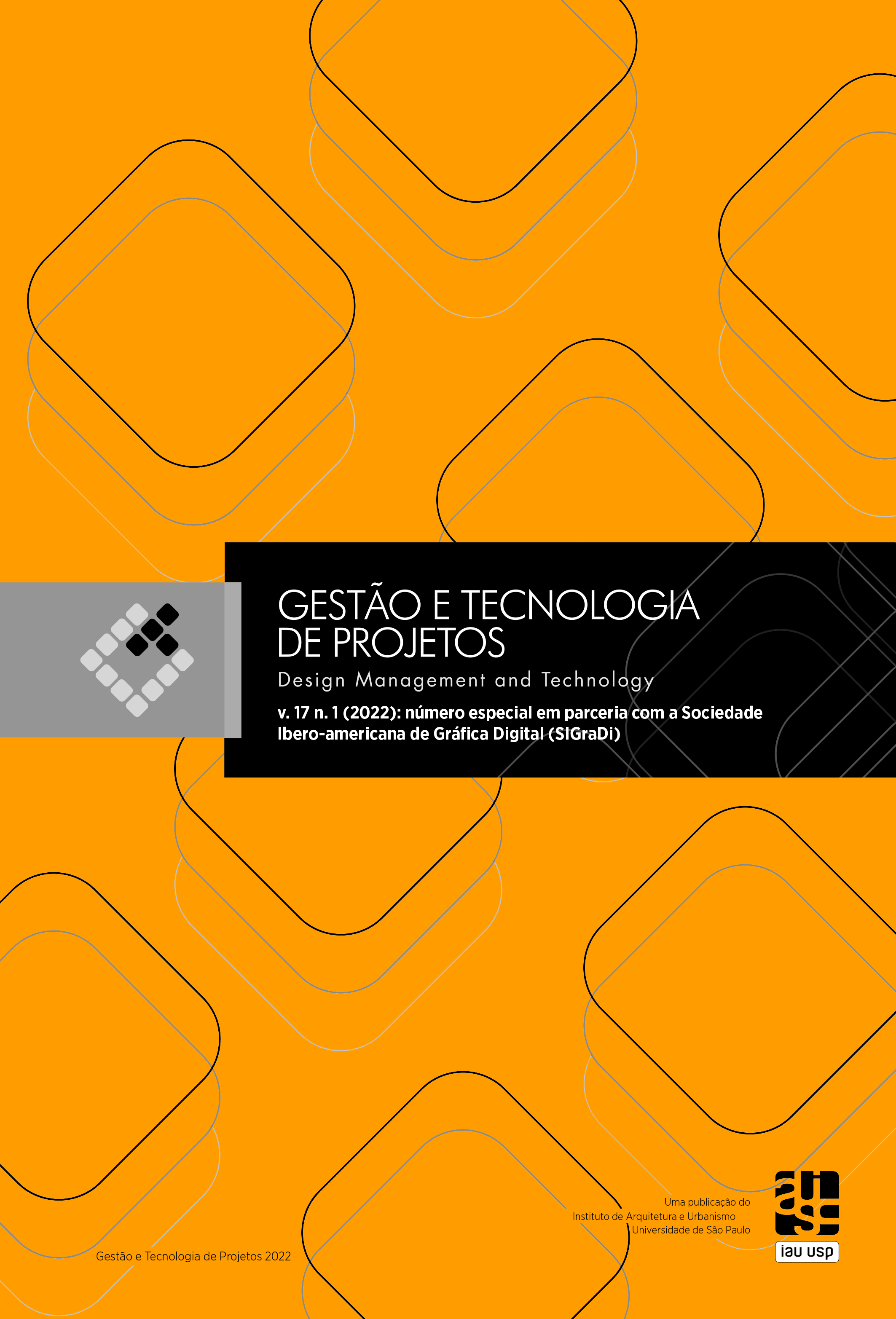Assistive technologies and disability: a gathering between women-mothers and digital fabrication in Fab Labs
DOI:
https://doi.org/10.11606/gtp.v17i1.182632Keywords:
Mulheres, Deficiência, Fabricação digital, Fablabs, ProjetosAbstract
The space that new technologies have occupied in people's daily lives is increasingly broad. However, such occupation does not tend to be democratic and egalitarian. From this perspective, this article aims to present perceptions about the experiences carried out in a project developed on the following pillars: women-mothers, disabilities and the development of Assistive Technology in spaces known as Fablabs. Through an exploratory and qualitative approach, this study introduces an overview of the research, followed by explorations and reflections on the activities carried out. In its practical steps, among others, ethnographic and Design Research methods were used. The group of women, mothers of children with disabilities, whose number of members varied during the practices (from two to five people), carried out activities to develop assistive technology products using digital manufacturing tools in a public laboratory of the Rede Fablab Livre SP, in São Paulo, Brazil. The thoughts and analysis presented on this piece of study are related to the questions of interpretation of the meanings of the activities in these spaces for the group and their identifications with the performed technological tasks. In this way, we seek to contribute to a debate regarding the occupation of environments of the Fablab type, focused on a social and plural participation of its users.
Downloads
References
BERSCH, R. Introdução à Tecnologia Assistiva. Porto Alegre: Assistiva – Tecnologia e Educação, 2017.
BUCKLEY, C. Made in Patriarchy: Toward a Feminist Analysis of Women and Design. Design Issues, v. Vol. 3, n. No. 2, p. pp. 3 – 14, 1986. DOI: https://doi.org/10.2307/1511480
CHIOVETTI, S. P. Inovação nos Serviços Públicos na cidade de São Paulo (2013-2016). São Paulo: Fundação Perseu Abramo. 136 p, 2017.
CRUZ, D. M. C.; EMMEL, M. L. G. Uso e abandono de tecnologia assistiva por pessoas com deficiência física no Brasil. Revista Digital, Buenos Aires, ano 17, n. 173, 2012.
FAB FOUNDATION. Fab Lab Network. S/d. Disponível em: < https://fabfoundation.org/global-community/#:~:text=More%20than%201%2C750%20Fab%20Labs%20all%20over%20the%20globe!&text=Because%20all%20Fab%20Labs%20share,laboratory%20for%20research%20and%20invention >. Acesso dia 19 de janeiro de 2021.
FAB LAB RECIFE. Movimento Mulheres Maker. Disponível em: <https://www.fablabrecife.com/o-que-fazemos/inovacao-maker/movimento-mulheres-makers/>. Acesso em: 20 jan. 2021.
FAULKNER, W. The technology question in feminism: a view from feminist technology studies. Women’s Studies International Forum, Vol. 24, No. 1, pp. 79–95, 2001. DOI: https://doi.org/10.1016/S0277-5395(00)00166-7
FREIRE, P. Pedagogia da Autonomia: Saberes necessários à prática educativa. São Paulo: Paz e Terra, 1996. p. 54
FREIRE, P. Pedagogia do Oprimido. Rio de Janeiro/São Paulo: Paz e Terra, 2018.
GERSHENFELD. N. How to Make Almost Anything: The Digital Fabrication Revolution. Foreign Affairs, 91, n. 6, p. 43-57, 2012.
HAMIDI, F. et al. Participatory Design of DIY Digital Assistive Technology in Western. In: Proceedings of 2nd African Conference for Human Computer Interaction (AfriCHI’18), 2018. DOI: https://doi.org/10.1145/3283458.3283478
IBGE – Instituto Brasileiro de Geografia e Estatística. Censo Demográfico 2010. Resultados gerais da amostra. Rio de Janeiro: IBGE, 2012.
ITS BRASIL. Instituto de Tecnologia Social. S/d/ Disponível em: < http://itsbrasil.org.br/ > Acesso dia 18 de janeiro de 2021.
KILOMBA, G. Memórias da Plantação: episódios do racismo cotidiano. Rio de Janeiro: Cobogó, 2019.
LAMB, M. E.; BILLINGS, L. A. L. Fathers of children with special needs. In: M. E. Lamb. (Org.). The role of the father in child development. London: John Wiley & Sons,. p. 179-190, 1996.
MINAS QUE PROGRAMAM. Minas que Programam. Disponível em: <https://minasprogramam.com/>. Acesso em: 20 jan. 2021.
MENA, F. “Pandemia é resposta biológica do planeta”, diz físico Fritjof Capra. Folha de São Paulo. 2020. Disponível em: < https://www1.folha.uol.com.br/fronteiras-do-pensamento/2020/08/pandemia-e-resposta-biologica-do-planeta-diz-fisico-fritjof-capra.shtml?pwgt=l7kor9scpvbavbfwzz9yt5f9nubbig22crukp5g9uls7p2wy&utm_source=whatsapp&utm_medium=social&utm_campaign=compwagift&fbclid=IwAR3o9BpFcZrzyr-v7TfBToFxEq1nbFakS9SPCL_070h12As3fYyh0GUczPM > Acesso em: 10 jan. 2021.
PERROT, M. Minha história das mulheres. São Paulo: Contexto, 2007.
PRETALAB. Pretalab. Disponível em: <https://www.pretalab.com/>. Acesso em: 20 jan. 2021.
VENDRUSCULO, L. E. B. A descoberta da deficiência do filho: o luto e a elaboração dos pais. 2014, 34 f. Monografia (Bacharelado em Psicologia) – Departamento de Humanidades e Educação, Universidade Regional do
Downloads
Published
Issue
Section
License
Copyright (c) 2021 Juliana Maria Moreira Soares, Paulo Eduardo Fonseca de Campos

This work is licensed under a Creative Commons Attribution-NonCommercial-NoDerivatives 4.0 International License.
Copyright Notice
Authors who publish in this journal agree to the following terms:
- Authors retain the copyright and grant the journal the right of first publication, with the article simultaneously licensed under the Creative Commons Attribution License BY NC ND, which allows the sharing of article with acknowledgment of authorship and initial publication in this journal.
- Authors are authorized to take additional contracts separately, for non-exclusive distribution of version of the article published in this journal (e.g. publish in institutional repository or as a book chapter), with acknowledgment of authorship and initial publication in this journal.
- Authors are allowed and encouraged to publish and distribute their research work online (e.g. in institutional repositories or on their personal page) at any point before or during the editorial process, as this can generate productive changes, as well as increase the impact and the citation of published article (See O Efeito do Acesso Livre).



